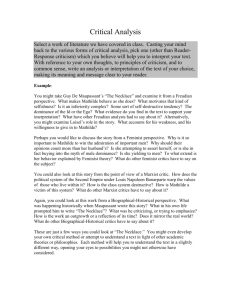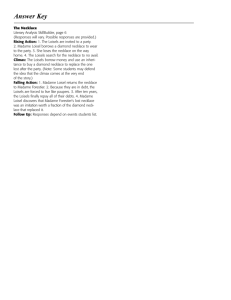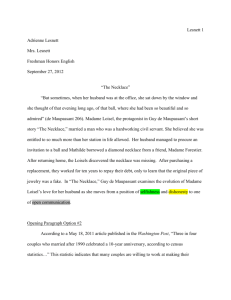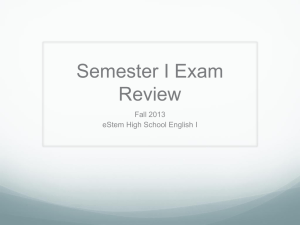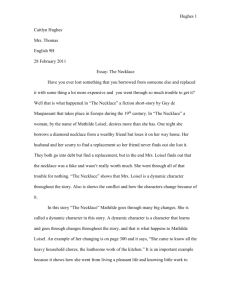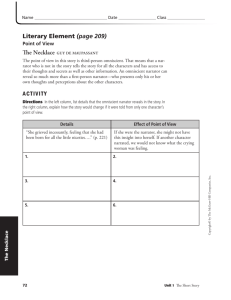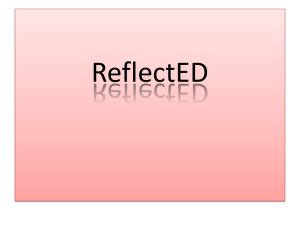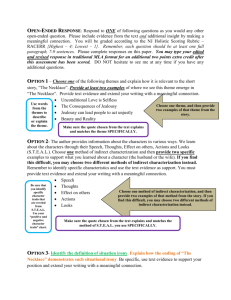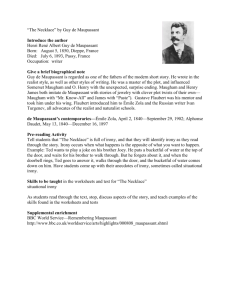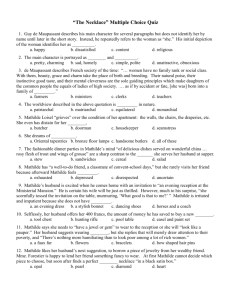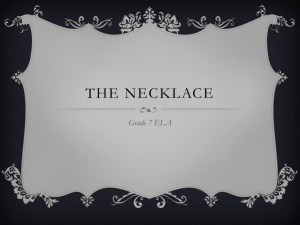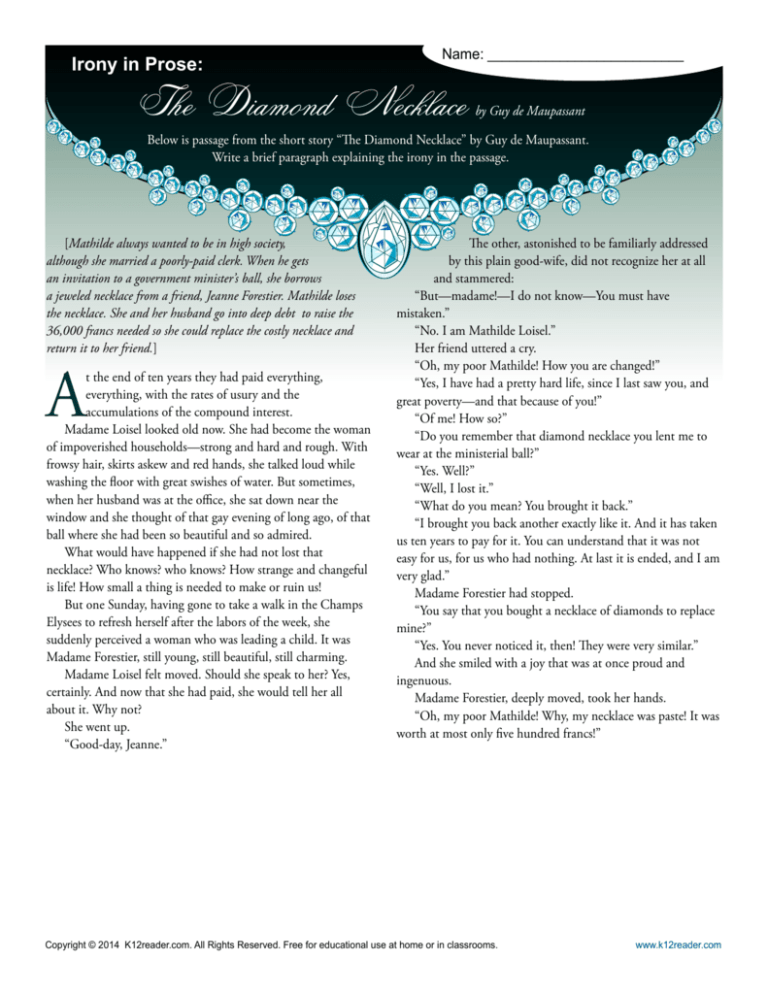
Irony in Prose:
Name: ___________________________
The Diamond Necklace
by Guy de Maupassant
Below is passage from the short story “The Diamond Necklace” by Guy de Maupassant.
Write a brief paragraph explaining the irony in the passage.
[Mathilde always wanted to be in high society,
although she married a poorly-paid clerk. When he gets
an invitation to a government minister’s ball, she borrows
a jeweled necklace from a friend, Jeanne Forestier. Mathilde loses
the necklace. She and her husband go into deep debt to raise the
36,000 francs needed so she could replace the costly necklace and
return it to her friend.]
A
t the end of ten years they had paid everything,
everything, with the rates of usury and the
accumulations of the compound interest.
Madame Loisel looked old now. She had become the woman
of impoverished households—strong and hard and rough. With
frowsy hair, skirts askew and red hands, she talked loud while
washing the floor with great swishes of water. But sometimes,
when her husband was at the office, she sat down near the
window and she thought of that gay evening of long ago, of that
ball where she had been so beautiful and so admired.
What would have happened if she had not lost that
necklace? Who knows? who knows? How strange and changeful
is life! How small a thing is needed to make or ruin us!
But one Sunday, having gone to take a walk in the Champs
Elysees to refresh herself after the labors of the week, she
suddenly perceived a woman who was leading a child. It was
Madame Forestier, still young, still beautiful, still charming.
Madame Loisel felt moved. Should she speak to her? Yes,
certainly. And now that she had paid, she would tell her all
about it. Why not?
She went up.
“Good-day, Jeanne.”
The other, astonished to be familiarly addressed
by this plain good-wife, did not recognize her at all
and stammered:
“But—madame!—I do not know—You must have
mistaken.”
“No. I am Mathilde Loisel.”
Her friend uttered a cry.
“Oh, my poor Mathilde! How you are changed!”
“Yes, I have had a pretty hard life, since I last saw you, and
great poverty—and that because of you!”
“Of me! How so?”
“Do you remember that diamond necklace you lent me to
wear at the ministerial ball?”
“Yes. Well?”
“Well, I lost it.”
“What do you mean? You brought it back.”
“I brought you back another exactly like it. And it has taken
us ten years to pay for it. You can understand that it was not
easy for us, for us who had nothing. At last it is ended, and I am
very glad.”
Madame Forestier had stopped.
“You say that you bought a necklace of diamonds to replace
mine?”
“Yes. You never noticed it, then! They were very similar.”
And she smiled with a joy that was at once proud and
ingenuous.
Madame Forestier, deeply moved, took her hands.
“Oh, my poor Mathilde! Why, my necklace was paste! It was
worth at most only five hundred francs!”
Copyright © 2014 K12reader.com. All Rights Reserved. Free for educational use at home or in classrooms. www.k12reader.com
Irony in Prose:
Key
Name: ___________________________
The Diamond Necklace
by Guy de Maupassant
Below is passage from the short story “The Diamond Necklace” by Guy de Maupassant.
Write a brief paragraph explaining the irony in the passage.
[Mathilde always wanted to be in high society,
although she married a poorly-paid clerk. When he gets
an invitation to a government minister’s ball, she borrows
a jeweled necklace from a friend, Jeanne Forestier. Mathilde loses
the necklace. She and her husband go into deep debt to raise the
36,000 francs needed so she could replace the costly necklace and
return it to her friend.]
A
t the end of ten years they had paid everything,
everything, with the rates of usury and the
accumulations of the compound interest.
Madame Loisel looked old now. She had become the woman
of impoverished households—strong and hard and rough. With
frowsy hair, skirts askew and red hands, she talked loud while
washing the floor with great swishes of water. But sometimes,
when her husband was at the office, she sat down near the
window and she thought of that gay evening of long ago, of that
ball where she had been so beautiful and so admired.
What would have happened if she had not lost that
necklace? Who knows? who knows? How strange and changeful
is life! How small a thing is needed to make or ruin us!
But one Sunday, having gone to take a walk in the Champs
Elysees to refresh herself after the labors of the week, she
suddenly perceived a woman who was leading a child. It was
Madame Forestier, still young, still beautiful, still charming.
Madame Loisel felt moved. Should she speak to her? Yes,
certainly. And now that she had paid, she would tell her all
about it. Why not?
She went up.
“Good-day, Jeanne.”
The other, astonished to be familiarly addressed
by this plain good-wife, did not recognize her at all
and stammered:
“But—madame!—I do not know—You must have
mistaken.”
“No. I am Mathilde Loisel.”
Her friend uttered a cry.
“Oh, my poor Mathilde! How you are changed!”
“Yes, I have had a pretty hard life, since I last saw you, and
great poverty—and that because of you!”
“Of me! How so?”
“Do you remember that diamond necklace you lent me to
wear at the ministerial ball?”
“Yes. Well?”
“Well, I lost it.”
“What do you mean? You brought it back.”
“I brought you back another exactly like it. And it has taken
us ten years to pay for it. You can understand that it was not
easy for us, for us who had nothing. At last it is ended, and I am
very glad.”
Madame Forestier had stopped.
“You say that you bought a necklace of diamonds to replace
mine?”
“Yes. You never noticed it, then! They were very similar.”
And she smiled with a joy that was at once proud and
ingenuous.
Madame Forestier, deeply moved, took her hands.
“Oh, my poor Mathilde! Why, my necklace was paste! It was
worth at most only five hundred francs!”
Student’s answer will vary, but should include a reference to Mathilde’s borrowing so much money to buy a real diamond
necklace, when the one she borrowed was a inexpensive fake diamond necklace. Mathilde’s life would have been
drastically different if she had known the necklace was fake.
Copyright © 2014 K12reader.com. All Rights Reserved. Free for educational use at home or in classrooms. www.k12reader.com

